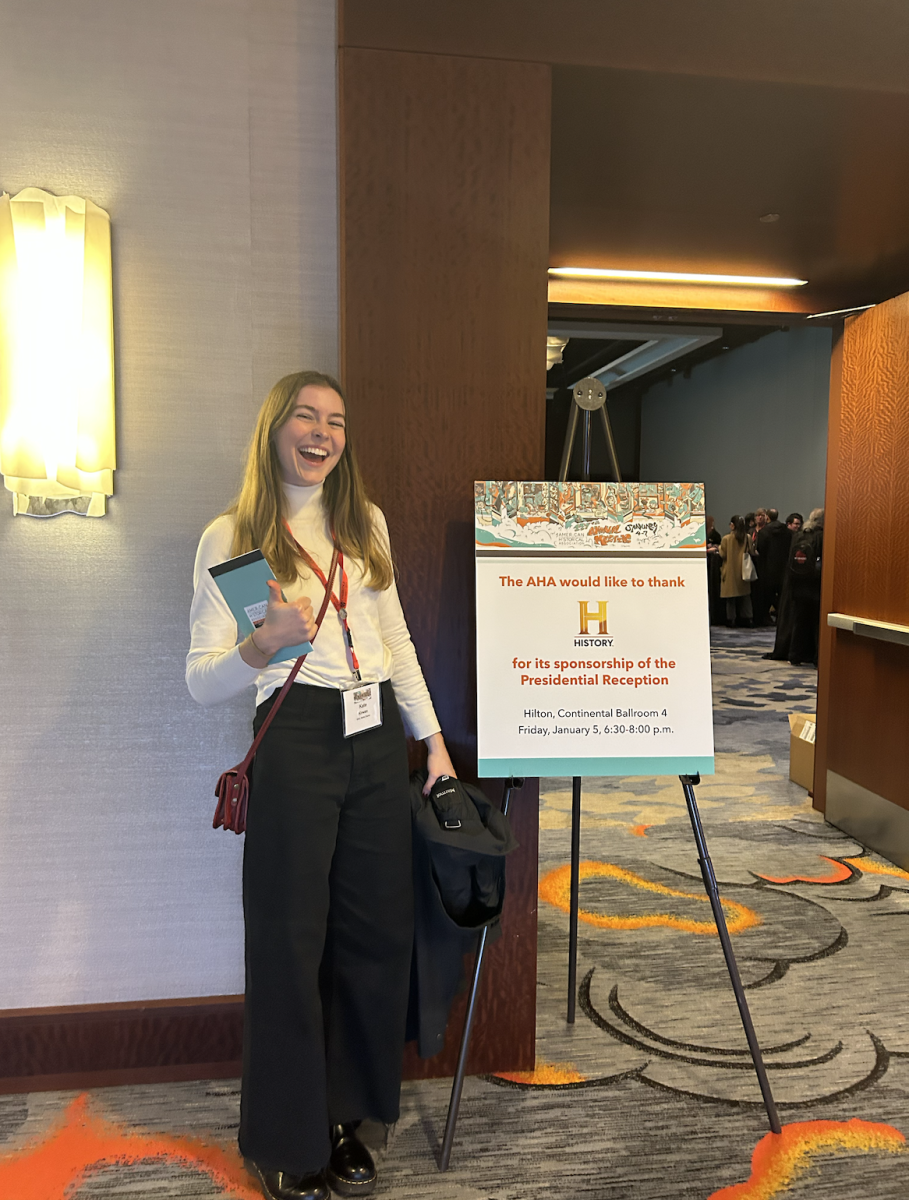 Following the holiday season, I had the opportunity to attend the 2024 American Historical Association Annual Meeting in San Francisco. From January 4th to the 7th, I dove headfirst into a whirlwind of sessions and panels, exploring topics ranging from urban planning and smog in Andean capitals to the histories of archaeology. While my research with Professor Debra Javeline is anthropological and political in nature, the knowledge I gained from this conference was indispensable to both our project and my own study of anthropology. The AHA taught me the importance of interdisciplinary conversation, and the importance that a base of history provides many–if not all–other disciplines in the liberal arts.
Following the holiday season, I had the opportunity to attend the 2024 American Historical Association Annual Meeting in San Francisco. From January 4th to the 7th, I dove headfirst into a whirlwind of sessions and panels, exploring topics ranging from urban planning and smog in Andean capitals to the histories of archaeology. While my research with Professor Debra Javeline is anthropological and political in nature, the knowledge I gained from this conference was indispensable to both our project and my own study of anthropology. The AHA taught me the importance of interdisciplinary conversation, and the importance that a base of history provides many–if not all–other disciplines in the liberal arts.
As I rested at the San Francisco airport, basking in the golden glow of California's sun (a significant upgrade from Indiana's perma-cloud, might I add), excitement and a hint of apprehension came upon me as I waited for my Uber. This was my first time attending an academic conference, so to be completely honest, I was a bit nervous about what the next three days would hold. These feelings were amplified as an undergraduate in a sea of graduate students, professors, and K-12 history teachers.
After arrival, I had marked on my program to attend the undergraduate orientation and reception. It was a wonderful experience to connect with other undergraduate students right away, as there were only about 30 of us total. During this reception amongst undergraduate students and professors, I was speaking with a professor about my research with the Kellogg Institute, as well as my major in anthropology. Her first question for me was “What brings you to the AHA as only an undergraduate if you aren’t majoring in history?”
Initially defensive, I quickly embraced the question as a catalyst for introspection. Why was I here? My response, initially focused on archaeology and a historical lens for anthropology, evolved into a more profound understanding following the AHA annual meeting.
I have always been interested in history, but it was not until my attendance at this conference that I began to see how vital history is. Not as a lens to view anthropology through, but also to understand and comprehend the world around me wherever I turn. In sessions such as “Conservationist Conflicts in the Americas,” “Migrations and Material Culture,” and “Ecologies of Coercion: Comparative Perspectives on Environmental Conservation beyond Colonization,” I began to understand and internalize how critical history is to fully understanding why the environment is in the state it is, and how our historical human actions have led to the extreme effects we see today. My research with Professor Javeline is centered around how humans have, and can, best adapt to climate change, and this can only be analyzed through a lens of the conditions and actions that have created the need for adaptation in the first place.
The last session I attended was a film screening of “Town Destroyer” by Snitow-Kaufman producers. This film examines the debate in San Francisco of a mural in a local high school depicting the legacy of George Washington and his harming of black and indigenous individuals during his lifetime. The makers of this film left the audience with striking quotes: “A historian’s role is to unveil some sort of instability in the way we view the past–so you can ask ‘Who?’ ‘What?’ ‘Why?’ We hope our film does just that.” This sentiment echoed the myriad questions running through my mind post-conference.
After three days of engaging panels, talks with researchers and academics at the career fair, and a stack of free books in my hands, I leave San Francisco with more questions than I started with.
The perpetual curiosity is what makes research so engaging to me – there's always another question to ask. I do know, however, that the diverse perspectives, debates, and collective histories unveiled at conferences bring us one step closer to a richer understanding of the human experience. In the case of Javeline’s research, it sheds light on the human experience in relation to our historical interactions with the environment.
I look forward to applying what I have learned from this experience in my research, classes, and future career. I hope to continue attending conferences after seeing how energizing and engaging they can be for an undergraduate student like myself.





